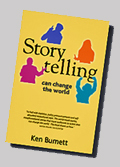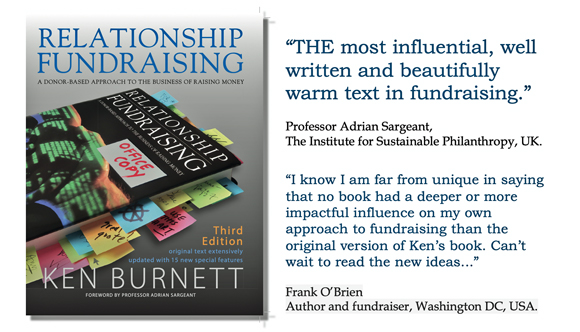|
Blog 23rd March 2016. As the Commission
The point is that by referring to and treating my mum as a lapsed donor these charities not only made her life unpleasant, they all also lost out on any prospect of picking up a legacy.
Who was it who decided cheapest is invariably and always best for the voluntary sector, when we know from our personal and business lives that cheapest is almost invariably not best?
|
Our great fundraising profession has slipped unthinkingly into some outlandishly inappropriate language. I’m talking about the terminology we fundraisers routinely deploy when we refer to those nice people, our donors and potential donors. We casually describe them as targets, prospects and segments. We seek to acquire, convert, retain and upgrade them. We talk of optimising their revenue potential and subject them to audits, scripts, screening and customised packages. We wax long about returns on investment, low value responders, mid and major donors, or HNWIs. We refer to our worst performers as the residue, the sediment, even the dead pool. The most carelessly denigrating term of them all, I feel (though I should suspend judgement till I’ve heard Dr Andrea Macrae’s conclusions, see below*), is that super-villain arch-nemesis of fundraisers everywhere, the lapsed donor. Anyone deserving such a label must surely be irredeemably suspect, a lost soul. To me lapsed donor implies character flaws at least as serious as America’s ‘moral turpitude’, or that biblical condemnation of old, the ‘fallen woman’. I often describe my mother’s experiences at the hands of direct mailing fundraisers. As she grew elderly and a little forgetful my mother – I hesitate to admit it but yes, even my sainted mum herself – became a lapsed donor. Not deliberately, you’ll appreciate. Not with any malice aforethought or neglectful intent. But what a very unpleasant experience it was, for her. For years my mum supported ten or more British charities. These organisations often made her very uncomfortable, reporting as they did examples of cruelty to animals or children, dangers to health and other diverse threats and nastiness. Then in turn they’d comfort and reassure her with details of their campaigns and achievements that she’d contributed to, that she could identify with and feel a part of. She loved supporting them. Then quietly, as the years passed, she stopped sending in her regular gifts. Not by choice, but because she’d become old. It started with overlooked payments and missed mailings. That’s when she became a lapsed donor. At this point in her vulnerable twilight years she began to be besieged by the very charities she’d once sustained, with ever more strident demands to reactivate, to renew her support. And really she didn’t like that one bit. So what had changed, for my mum? The point is that by referring to and treating my mum as a lapsed donor these charities not only made her life unpleasant, they all also lost out on any prospect of picking up a legacy when, a short while later, my mother made her last will. What’s in a name, or a negative term? For putting our donors’ interests, not our financial targets, at the heart of our strategies is the most important thing we need to do now, to right what we’ve recently got so badly wrong. *Dr Andrea Macrae of Oxford Brookes University is leading a major project for the Commission on the Donor Experience, investigating how fundraising language can better engage with and meet the needs of donors. This article first appeared on the UK Fundraising website. Opinion 2 The question is, given there had been so many prior warnings (see earlier blogs from me and others) and so many fundraisers have professed for so long to be donor-focused or donor-led, how is it that bad fundraising on the scale that’s been reported could ever have been allowed to take such a hold? Outlawing inappropriate practices in at least parts of our profession is certainly a big part of the answer, and these we can address (see here). But there are I think at least two other big factors that have brought us to our current sorry state. • Our culture needs to change. Massively. Who was it who decided cheapest is always best for the voluntary sector when we know from our personal and business lives that it so seldom is and that following such a fancy so often leads to failure, if not ruin? My comments opposite on the salary issue connect here. The sad truth is fundraisers have colluded to keep their donors in ignorance of commercial reality and are now paying a heavy price for the self-inflicted wound of not being even slightly understood. The cost of ‘admin’ is a prime example. No donor should support a cause that doesn't spend enough on admin, for if a charity is not properly administered how can anyone expect their gift to get to where it’s needed? Yet we’ve allowed our publics to believe admin is a dirty word. The voluntary sector model sorely needs revising and soon. I’d start with changing its name, from ‘not-for-profit’ to ‘for change.’ Then I’d set about restructuring our organisations by uniting them around a great big fat WHY that’s clearly defined and irresistible. © Ken Burnett 2016
|
THIS COLLECTION OF VIEWS AND OPINIONS IS THE FIRST IN AN OCCASIONAL FOCUS ON ASPECTS OF THE DONOR EXPERIENCE THAT WE MIGHT WANT TO CHANGE.
Most fundraisers and their organisations would have considered their initial effort at converting her to direct debit a success and left it at that. Learning to listen better could be a quick win that might make all the difference, for donors like Marjorie. Donor experience quick win no 2 Planting a commitment to the five Fs in your organisation could be an easy quick win. Implementing it could vastly improve your donors’ experiences. Opinion 3 Why in this society of ours is it OK to criticise leaders who do good things for a living for earning salaries less than one-twentieth of the salaries paid to leaders whose organisations routinely do bad or at least selfish things? By definition large international NGOs are complex organisations. They’re obliged to work around the world in dangerous, difficult environments, tackling society’s most complicated, demanding, hard-to-fix issues. These organisations simply have to be well run or all their donors’ money would be wasted. Forty years ago, when I started in fundraising, charities were habitually led by well-meaning but generally not very competent ex-army or navy types. Nice chaps and seemingly credible, though not effective, gifted, or in any way visionary. But they were cheap. In the 70s and 80s people came to realise that this false economy was holding the sector back. More effective managers were recruited and their charities and causes prospered directly, allowing much more good to be done. How can our sector allow itself to go backwards, to be distracted by the evident absurdity of claims that charities shouldn’t pay appropriate salaries for the scale and importance of their top jobs? Where when it’s needed is our vigorous defence of sector salaries? When ill-informed commentators attack our organisations and their leaders’ integrity, imagine how your family would feel if your not unreasonable earnings were so publicly criticised. It’s strange that seemingly intelligent people entertain such foolishness, yet stranger still that our sector can’t mount a more robust defence than it does. For it’s a curiously distorted logic that assumes cheapest is always best for charities, when we all know it almost invariably isn’t best for almost everything else in life. As of March 2016 the average earnings of a FTSE 100 CEO in Britain is £4.6 million. If not actually corrupt this is ludicrous, profligate and obscene. But people way too timid to condemn this inequality seem quite willing to cheerfully castigate the CEOs of Britain’s largest aid agencies for what is simply a reasonable rate for the job they do. One I know who was vilified in the media led an organisation that employs many thousands working in most of the world’s most challenging and dangerous places. Yet the only charge against him was that he was remunerated at less than four per cent of what other CEOs, often with less demanding and much less important roles, are paid. It’s like saying aid charities should deliver their live-saving supplies in the cheapest of leaky containers on old jalopy trucks whose wobbly wheels will fall off at the first big bump. Because cheap is good, right? As an unpaid volunteer on INGO trustee boards I’ve had to make decisions about CEO pay. No one wants to pay more than the optimum to recruit and retain the right kind of individual. But to pay less and accept inferior leadership is to betray beneficiaries, donors, the organisation, staff and the cause. These vital organisations demand and deserve sound leadership, the very best that we can find. What on earth is wrong with paying their CEOs at the very low end of what these good people might earn if they were to go elsewhere? If we don’t pay them properly, of course that’s just what they will do. The losers then will be everyone these causes help. • * * * * • * * • • * * * * • • * * * * • • * * * * •• * * Related earlier blogs: Home page | Current blogs | Article archive DISCLAIMER: Please note, though Ken Burnett was joint initiator of the Commission on the Donor Experience (with Giles Pegram CBE) and is fully committed to helping it to achieve its goals, these views are his own, entirely. With thanks to Alan Clayton for sharing Marjorie’s story.
|
|





